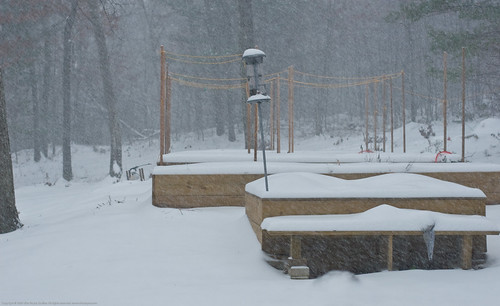
I am blogging in support of an effort to reclaim the right of the public to use the term “Urban Homestead” as well as other related terms, a right ostensibly taken by a family in California by filing for and obtaining a trademark on these terms. Not only this, they have chosen, ill advisedly, to send out letters that amount to “cease and desist” to bloggers, radio stations, public libraries, and authors who have used the term “Urban Homestead” even well before this family received trademark protection.
(You can learn more about and join this effort at this facebook page Take Back Urban Home-steading(s))

Some Background
If you have ever googled urban and homestead you likely got many many results relating to the very long tradition of homesteading here in the United States, both rural and urban. You likely also got hits for a broad range of books covering topics germane to urban homestead practices.
Along the way, you likely would have run across links to a suburban homestead project in Pasadena, California by the Dervaes family, a group of 3 young adults and their father.
On a small pad of cement, something like 1/8th of an acre when you subtract the footprint of the house, this family built a business out of growing salad greens and other vegetables for local restaurants.
As with other gardeners of a certain stripe, the Dervaes have recorded exactly what they get out of their raised beds and other horticultural methods. They have blogged about these efforts, including the biomass accounting. They have shared their use of chickens, ducks and dwarf goats in their suburban setting.
Over the years, the Dervaes have received a lot of media and have been identified with homesteading; they have become de facto spokespeople for homesteading even though they represent one family out of a huge number of homesteading families/couples/people.

Backlash
There has been a spontaneous backlash across the web to these actions amounting to widespread bad will against the Dervaes in light of their regressive efforts to enforce their dubious trademark claims.
Urban Homesteading, by its very nature, is anti-authoritarian because it requires breaking the long established or implied rules/mores of the modern urban landscape. People have long been disenfranchised from their urban environment by city practices that have excluded human-scale interaction. Some cities have allowed allotments or community gardens for decades and that works for those people who are fortunate enough to participate.
To break that structure, so as to have a few chickens, a compost heap, a garden, radicalizes or requires a radicalized mindset. That mindset can be part of a larger set of ideals that often fits within a progressive frame that values relocalization of food and economic activity, powering down, building personal and community resilience in the face of collapsing societal structures, good old fashioned frugality and simplicity.
The very act of obtaining a trademark and then the further ideological violence of enforcing the trademark on others in this nascent community of urban homesteaders is anathema to those progressive values.
I think it is this regressive practice that has shocked, awoken, and spurred to action a range of homesteaders on the web to stand up and say “no” to what the Dervaes have done, even as many of us have a whole lot of respect for what they have done before this bru-hah-ha.
The actions over the past couple of weeks have done tremendous damage to the respect people held for the Dervaes. We are in the midst of this scandal so it is hard to say how it will end. The Dervaes seem to be in seclusion, something I think it a good idea because their recent statements have only damaged their case further.

The Hard Way Forward?
If they were to ask me what to do, my advice would be: publicly commit the marks to the public domain, get a real lawyer and not a puppy-mill trademark lawyer in far off Florida, get a PR firm and DO WHAT THEY SAY, do some homework and understand your audience and customers, finally – apologize, lots. If you simply want to decamp to the 600 acre religious community built around rural homesteading, now might not be a bad time to do that – that is if you want to leave this wound undressed and festering.





























































![[Three men on a wharf with a shark hanging]](https://live.staticflickr.com/65535/54449408307_9402166476_s.jpg)




